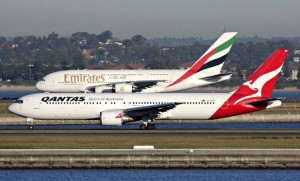
The landmark alliance between Qantas and Emirates has received final approval from Australia’s competition watchdog five days before the tie-up is due to take effect.
In a ruling released today, the Australian Competition and Consumer Commission (ACCC) said it was satisfied the alliance would result in “material, but not substantial” benefits to consumers.
However, as a condition of approval the ACCC ordered the two carriers to maintain at least their current level of four overlapping trans-Tasman routes, addressing a key concerns over the tie-up. Together, Qantas and Emirates account for 65 per cent of passenger capacity between Australia and New Zealand.
The ACCC also stopped short of granting the ten-year approval Qantas and Emirates had sought, instead giving five-year approval and requiring the airline’s to apply for reauthorisation in 2018.
The watchdog said the alliance would likely hurt competition in regions where Qantas and Emirates currently operate competing services. But it ruled that those detriments would be minimal because of competitive constraints, and said the public benefits outweighed the drawbacks.
“The ACCC considers that the alliance is likely to result in public benefits through enhanced products and service offerings by the airlines, and improved operating efficiency,” ACCC chairman Rod Sims said.
“In particular, the alliance is likely to provide Qantas and Emirates customers with increased access to a large number of existing frequencies and destinations under a single airline code, improved connectivity and scheduling, and access to each alliance partner’s frequent flyer programs. The alliance is also likely to provide the airlines with increased flexibility to manage their fleet.”
Qantas CEO Alan Joyce welcomed the decision and said the airlines were ready to commence joint services on March 31.
“Qantas is an Australian icon and the future of its international business is much brighter with this partnership,” he said. “Customers are already responding very strongly to the joint network that Qantas and Emirates have built, and to the frequent flyer benefits that extend across it, with a significant increase in bookings.”
The alliance mainly focuses on code-sharing services between Australia and Dubai, with Qantas re-routing its European services through the Emirates hub. In earlier filings with the ACCC, Qantas had argued that it needed the tie-up to save its money-losing international operations from becoming a “virtual network.”
The approval allows the two carriers to coordinate their passenger and cargo transport operations and related service and to jointly procure goods and services such as aviation fuel. The airlines did not seek authorisation for the supply of catering or aircraft cleaning services.




